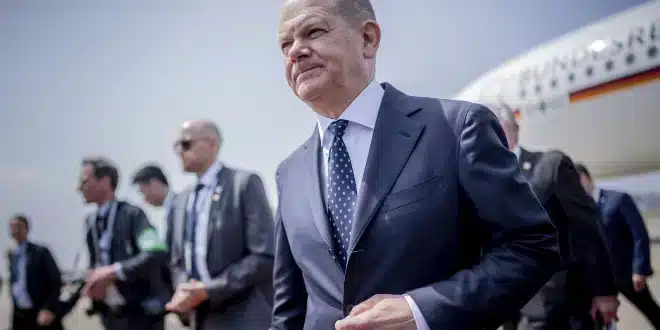During his talk at Tongji University in Shanghai, German Chancellor Olaf Scholz emphasized the need for fairness in trade relations with China, highlighting concerns over dumping and overproduction amid his visit marked by potential EU tariffs on Chinese electric vehicles and differing views on Russia’s actions in Ukraine. Scholz, addressing students, stressed the importance of unimpeded competition for companies, reflecting the sentiments of reciprocal treatment in trade practices.
The European Union is contemplating protective tariffs against low-cost Chinese electric vehicle imports that could dominate the European market, a move resisted by Germany’s auto sector. Hildegard Müller, head of Germany’s VDA, expressed that such tariffs could detrimentally impact trade relations and job security within Germany itself.
Scholz referenced past market fears when Japanese and Korean cars entered the German market, dismissing them as unfounded concerns and predicting a future where Chinese cars will similarly integrate into the German and broader European markets.
Scholz’s China tour began in Chongqing and will conclude in Beijing with meetings with Chinese President Xi Jinping and Premier Li Qiang, where he plans to discuss China’s stance towards Russia amidst the ongoing conflict in Ukraine. Scholz had recently reaffirmed Germany’s unwavering support for Ukraine in a conversation with Ukrainian President Volodymyr Zelenskyy.
China’s reluctance to denounce Russian aggression and its ongoing military collaborations with Russia, coupled with concerns over Taiwan’s sovereignty, contribute to the complexities of Sino-German relations. Scholz’s remarks in Shanghai also touched on the sanctity of international borders and the role of global institutions like the World Trade Organization in maintaining international order.
Despite the political tensions, China remains Germany’s top trading partner for the eighth consecutive year, with significant trade volumes exchanged between the two nations. This visit is Scholz’s second to China as chancellor, following a brief trip in 2022 under strict COVID protocols and after Germany had introduced a new strategy on China, which had received criticism from Beijing.


